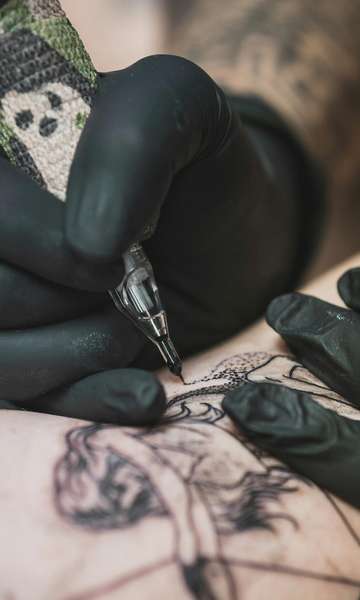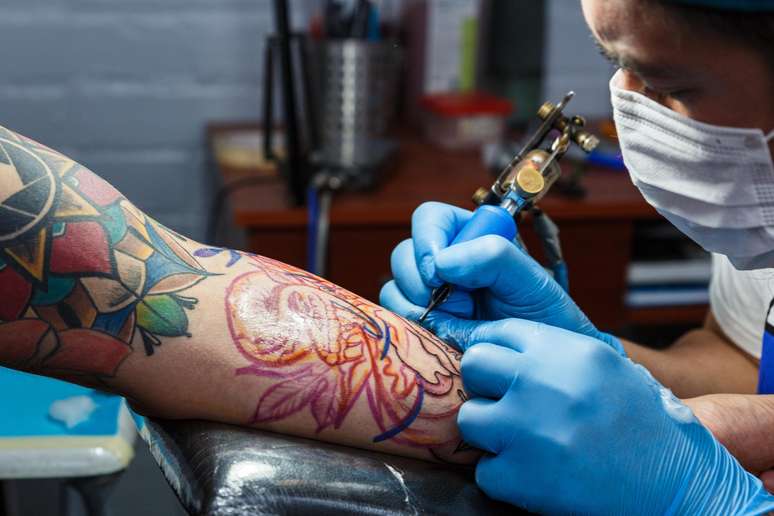Discover a dermatologist’s answer to 7 common questions on the topic
Summary
A study by the German Dalia Institute showed that Brazil is among the 10 countries where tattoos are done the most. In both tattoos and piercings, skin health care is essential.
A survey by the German Dalia Institute revealed that Brazil is among the 10 countries in the world where people get the most tattoos. In the top five positions of the ranking are Italy, Sweden, the United States, Argentina and Australia.
According to data from the National Association of Tattoo Artists, the tattoo market in Brazil grew by 50% in 2020. According to a survey by Sebrae (Brazilian Micro and Small Business Support Service), the number of new tattoo and piercing studios grew by 35% between 2019 and 2022.

Why does the tattoo become inflamed with some foods?
Despite the popularity of the two procedures, there are a number of myths and truths surrounding these two topics, especially as they relate to skin health. CEJAM dermatologist, Bruna Morassi, answers what is myth and what is true regarding the main doubts.
Can piercings really cause trauma to the skin?
REAL. Piercings can present several complications, such as trauma itself, local bleeding, bacterial infections and even viral transmissions, such as hepatitis, if the material is not properly sterilized at the time of piercing.
Skin irritation may also occur, both due to acute trauma and swelling, and to allergies to metals, especially materials such as nickel and gold. Therefore, it is important to favor the use of metals such as titanium or surgical stainless steel in piercings, as well as performing the procedure in a safe and reliable place.
Are skin irritations only common after piercing?
Myth. Contact allergies to metals, for example, can occur immediately if the person is sensitive to the material used in jewelry or can develop over months or even years. In these allergies, it is common for the piercing site to become red and irritated and may be itchy and scaly.
Can tattoos cause skin trauma?
REAL. Both decorative and permanent makeup tattoos can give rise to a transient acute inflammatory response, also induced by the trauma of the perforations performed during the procedures. Pain, blistering, crusting, and minor bleeding may occur. In more severe cases, the body may still respond with pus and fever.
Allergic reactions to tattoos are often linked to the type of pigment placed in the art. They can appear early or even years later, being chronic and persistent. Certain types of red pigment are more associated with chronic allergies.
Can people who have a skin disease get a tattoo normally?
Myth. In relation to patients suffering from dermatological diseases, tattoos are generally contraindicated, especially in cases of allergic diseases and conditions such as psoriasis and vitiligo, which can trigger lesions and trauma. However, each case must be evaluated individually with your dermatologist.
Are there any areas that, when performing either procedure, could cause greater health risks?
REAL. As for piercings, the areas most at risk of complications are the navel, followed by the ear. However, the most serious and risky complications occur with tongue and genital piercings. Regarding tattoos, areas of the body, such as the oral and genital mucosa, are considered contaminated sites, presenting a higher risk of complications.
Is there a place where there is a higher risk of developing keloids?
REAL. The most common places where keloids appear after these procedures are in the ear, shoulder, and chest regions. Remembering that it is more common in people between 10 and 30 years old, however, in general, it can happen to anyone.
Is it possible to improve skin healing after procedures?
REAL. In addition to local treatment and the use of healing ointments, it is recommended to avoid the consumption of alcohol and cigarettes, as well as maintain a balanced diet. It is important to highlight that diagnoses of hypertension, obesity, diabetes and autoimmune diseases can also interfere with the healing process and should be checked before these procedures.
Furthermore, it is essential to use sunscreen, especially in the case of tattoos. This is because inadequate sun exposure can not only compromise the aesthetic quality of the work, but also prolong healing times and increase the risk of complications.
Source: Terra
Ben Stock is a lifestyle journalist and author at Gossipify. He writes about topics such as health, wellness, travel, food and home decor. He provides practical advice and inspiration to improve well-being, keeps readers up to date with latest lifestyle news and trends, known for his engaging writing style, in-depth analysis and unique perspectives.







